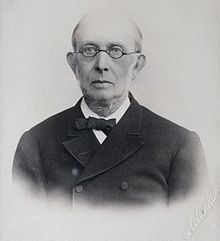
Back كونستانتين بوبيدونوستسيف ARZ Konstantin Pobedonotsev Azerbaijani Константин Победоносцев Bulgarian Konstantín Pobedonóstsev Catalan کۆنستانتین پۆبێدۆنۆستێڤ CKB Konstantin Petrovič Pobědonoscev Czech Konstantin Petrowitsch Pobedonoszew German Konstantín Pobedonóstsev Spanish Konstantin Pobedonostsev Basque کنستانتین پوبدونوستسف Persian
You can help expand this article with text translated from the corresponding article in Russian. (March 2023) Click [show] for important translation instructions.
|
Konstantin Pobedonostsev | |
|---|---|
 | |
| Ober-Procurator of the Most Holy Synod | |
| In office 24 April 1880 – 19 October 1905 | |
| Monarchs | |
| Preceded by | Dmitry Tolstoy |
| Succeeded by | Alexey Obolensky |
| Personal details | |
| Born | Konstantin Petrovich Pobedonostsev 30 November 1827 Moscow, Moscow Governorate, Russian Empire |
| Died | 23 March 1907 (aged 79) Saint Petersburg, Russian Empire |
| Nationality | Russian |
| Alma mater | Imperial School of Jurisprudence |
| Occupation | Jurist, teacher |
Konstantin Petrovich Pobedonostsev (Russian: Константи́н Петро́вич Победоно́сцев, IPA: [kənstɐnʲˈtʲin pʲɪˈtrovʲɪtɕ pəbʲɪdɐˈnostsɨf]; 30 November 1827[1] – 23 March 1907) was a Russian jurist and statesman who served as an adviser to three Russian emperors. During the reign of Alexander III of Russia, Pobedonostsev was considered the chief spokesman for reactionary positions and the éminence grise of imperial politics. Between 1880 and 1905, he served as Over-Procurator of the Most Holy Synod,[2] making him the non-clerical Russian official who supervised the Russian Orthodox Church.
His writings on politics, law, art, and culture emphasized the positive element of the spiritual and secular unification of Russia with the acceptance of Christianity, while simultaneously condemning the Jewish population. He warned of the negative element in Russia, portraying democratic and liberal movements as enemies of the national and religious unity of the Russian people. He opined that the task of achieving a harmonious society meant there was a collective responsibility to uphold political and religious unity, which justified the close supervision of Russian behaviour and thinking as a necessity.[3]
- ^ Исследование исторических документов и дневников самого Победоносцева указывает дату рождения 18 (30) ноября 1827 года. При этом во многих справочных и энциклопедических изданиях, опубликованных после смерти Победоносцева, указана иная дата: 21 мая (2 июня) 1827 года. Однако 21 мая — день тезоименитства, а не рождения Победоносцева. Причиной распространения ошибки, наиболее вероятно, является указание дня тезоименитства вместо дня рождения в дате на надгробном кресте
- ^ Peter Kropotkin (1902). "Russian Schools and the Holy Synod".
The Council of the Ministers, in which K. Pobedonostsev has a seat in his capacity of procurator of the Holy Synod...
- ^ John Basil, "K.P Pobedonostsev and the Harmonius Society". Canadian-American Slavic Studies 37.4 (2003): 415-426.